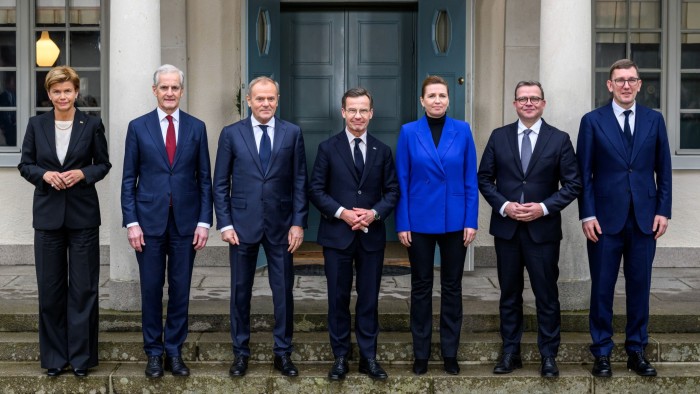Stay informed with free updates
Simply sign up to the Geopolitics myFT Digest — delivered directly to your inbox.
China’s growing support for Russia is hurting Beijing’s relations with Europe, according to some Nordic and Baltic leaders, as they also urged the EU to urgently toughen its response to hybrid warfare such as sabotage of critical infrastructure.
A Chinese vessel linked to the severing of two cables in the Baltic Sea is currently in international waters between Sweden and Denmark, the second time in 13 months that a ship from the country is suspected of causing damage to undersea infrastructure in the area.
The prime ministers of Finland and Sweden both told the Financial Times it was too early to reach conclusions on who caused the damage to Finnish-German and Swedish-Lithuanian data cables and why. A joint Finnish and Swedish investigation is under way.
But Petteri Orpo, the Finnish prime minister, said: “We have seen that behind Russia there is more and more China. I am concerned. I hope they have heard Europe’s message. It’s not good for relations between Europe and China if they increase their support to Russia to fight against Ukraine.”
Kristen Michal, Estonia’s prime minister, said at a Nordic-Baltic summit in Harpsund in Sweden: “It has happened two times already. Is it really bad seamanship? We need a neutral investigation.
“But these kind of incidents, plus also backing Russia [in Ukraine], this influences China’s ability to have business with Europe and limits their diplomatic possibilities.”
Some European countries had hoped to stay out of the growing geopolitical rivalry between the US and China, which is only likely to intensify when US president-elect Donald Trump returns to the White House.
But intelligence pointing to China supplying Russia with some military equipment for use in Ukraine has raised hackles in many European capitals.
China denies providing military support to Russia and instead accuses the west of “fanning the flames” of the conflict. Aside from military or dual use technology, Moscow has relied heavily on Beijing for economic and diplomatic backing since the conflict began.
The focus is now on the Chinese bulk carrier Yi Peng 3, whose anchor was visibly damaged in recent television images from just outside Danish territorial waters. The ship is being closely monitored by Swedish, Danish, and German state vessels.
Marine information shows the Yi Peng 3 passing by both the Finnish-German and Swedish-Lithuanian data cables close to when they were cut earlier this month.
Ulf Kristersson, Sweden’s prime minister, has urged China to order the Yi Peng 3 to move to Swedish waters to help the investigation.
He said: “We are extremely careful not to rush to conclusions, not to accuse anybody of anything that is not well grounded. On the other hand, we take it very, very seriously. We do not simply assume it was just an accident . . . This is not the first time.”
China’s ministry of foreign affairs said on Wednesday that Beijing’s “communication channels with Sweden and other relevant parties are open”. “China has always supported jointly safeguarding the security of international submarine cables and other infrastructure in accordance with international law,” it said.
Last year the anchor from another Chinese ship, the container vessel Newnew Polar Bear, damaged a Baltic gas pipeline between Finland and Estonia. Finnish and Estonian authorities have not said whether they believe that was done intentionally or by accident.
Europe has also been hit by many recent incidents of sabotage and other acts of hybrid warfare such as sending migrants across borders, many of which have been blamed by authorities on Russia.
Michal, Orpo and Kristersson all agreed that Europe needed to present Russia with a tougher co-ordinated answer to the hybrid threats.
“Some kind of co-ordinated response is essential. For Russia, everything that to us is politeness is weakness and they will exploit it,” said Michal.
“Europe needs to act a little bit stronger . . . In Estonia we have this policy that if somebody attacks us, for instance on cyber, we usually try to catch the guys and attribute to Russia.”
Orpo added: “Every European country has to wake up and understand that Russia attacks against us with hybrid tools all the time.
“That’s why we have to react and make it clear that they cannot weaken or scare us. My message to Europe is also is that we must be well prepared against all types of threats.”
Additional reporting by Joe Leahy in Beijing
Read the full article here




